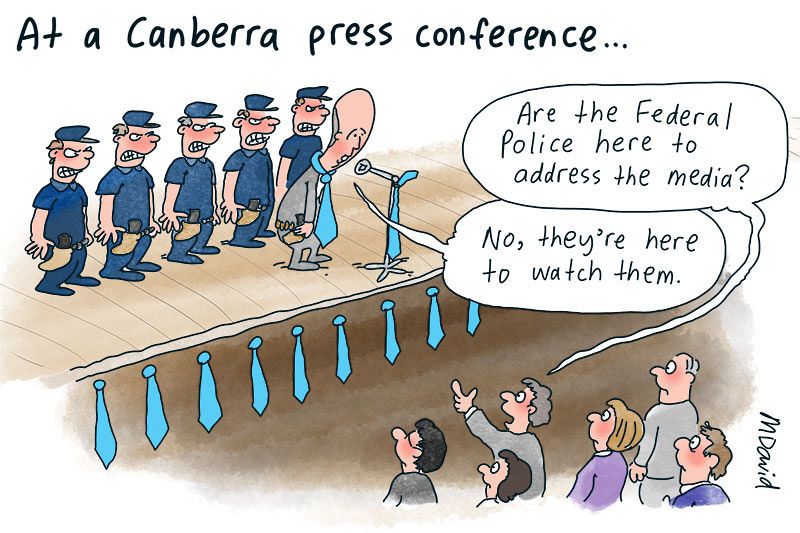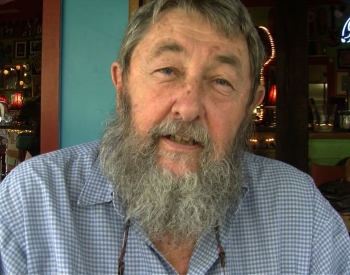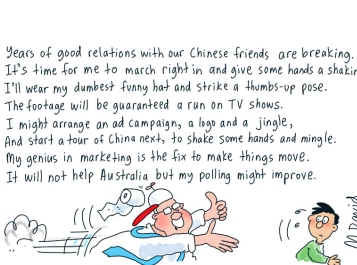Our Prime Minister assures us that the AFP raids of last week had absolutely nothing to do with him. Well, of course not — he and his Government are never responsible for anything.
AS THE ECONOMY STAGGERS towards recession – tanking growth, moribund wages, rising unemployment and massive under-employment, consumer spending falling away, national debt doubled – it has nothing to do with Scott Morrison and his colleagues. They have been in office for six years but, for most of that time, all the failures were the fault of the previous Labor Opposition — until they became the chilling effects of international headwinds.
The Governor of the Reserve Bank, Philip Lowe, is becoming desperate – he is running out of interest rates to cut, and in any case, that will never be enough to fix things. He is virtually pleading for the Government to do something, anything — more stimulus, a serious infrastructure program as opposed to the ad hoc pork barrelling that preceded the last election.
But hey, it’s nothing to do with ScoMo. He has his own agenda. He will stay the course for a few more years until the big tax cuts for the wealthy kick in and then the rest of us may soak up a few drops when and if they trickle down.
Morrison has always been blameless — remember when the chaotic brawl in August last year delivered him his leadership? He was never involved — it was divine intervention. He emerged fully formed and immaculate, like Venus rising from the foam, an innocent bystander.
And so it must have been when the police arrived to execute their warrants to troll through the works of News Corp’s Annika Smethurst and the staff at the ABC. The plods were just doing their job — no one is above the law. Nothing to see here, so move on — and do it quickly before you, too, get into trouble.
But as the AFP Assistant Commissioner Neil Gaughan pointed out, the law is made by the Government. The laws that enabled him to ring on the raids were pushed through the Parliament by Morrison and the previous governments of which he was an integral part, and they were enacted in the full knowledge – and the overt encouragement – of the way they would be used.
Gaughan says, in effect, that he is just obeying orders; Morrison replies that their implementation has nothing to do with the legislators that promulgated them. This is utterly implausible deniability; unadulterated bullshit.
Morrison says he is completely comfortable with the fact that the laws are being enforced — and I’ll bet he is. After all, they are his laws. By definition, all governments are comfortable with their own laws — and that applies to the governments of all regimes. There was nothing illegal, at least domestically, about the repressions in Russia, China, Turkey or North Korea — or, for that matter, Nazi Germany.
Australia is not yet at that stage — the boots on the staircase, the midnight breaking down of the door. But this does not mean, as Morrison tries to claim, that these raids are entirely compatible with the democratic process.
The backlash against the raids from numerous human rights defenders both, locally and overseas, shows how fragile freedom of the press can be when governments drift into authoritarianism to maintain their own self-interest above that of the public.
Obviously, press freedom, or even the wider issue of free speech, cannot be absolute. We accept restrictions on defamation, bans on incitements to violence, and terrorism and suppression orders in the courts to ensure fair trials. The extent of such laws may be argued, but their existence is not seriously challenged.
And, as we are constantly reminded, there has to be a balance between the rights of the press and national security. But the "Catch 22" in that balance is that it is the government which determines just what constitutes national security.
In last week’s cases, Smethurst reported that the Home Affairs Minister Peter Dutton and his departmental doppelganger, Mike Pezzullo, wanted to use the secret spooks of the Australian Signals Directorate (ASD) to engage in domestic surveillance. The ABC was investigating potential war crimes by Australian troops in Afghanistan.
In a functioning democracy, such revelations would surely enhance national security rather than harm it. But the current Government regards security as little more than a synonym for secrecy and it follows that as much should be kept secret as possible. When in doubt, classify it and make a law to make disclosure – which includes even mentioning the existence of the classification – illegal.
This is not just overreach, it is the road to totalitarianism. In my career as a journalist, I have seen many classified documents – some marked "Top Secret" – and very few of them merited such status. Most had nothing to do with security — they were about protecting the government and its bureaucrats. Stamping them "classified" was lazy, incompetent, or deliberately deceptive.
But there was – and still is – no appeal against this process. If journalists, whistleblowers, or other defenders of transparency and honesty in public life are hauled before the courts, their trials are often conducted in secret as well — in the name of national security. It is the default option, the political philosopher’s stone. The simple words ”national security” override all other considerations.
It may be different if we had a bill of rights, or the equivalent, as all other democracies – not some, but all – have embraced. But not in Australia — a bill of rights would allow unelected judges to rule on the dictates of politicians. It could undermine national security.
Gaughan denied that the raids were an attempt to intimidate, which is disingenuous to the extreme. Obviously, people are intimidated when the cops spend hours rifling through their belongings in the hope of finding evidence that would have them charged and possibly gaoled. That’s precisely what these laws are for: to remind dissenters that "Big Brother" is constantly watching.
And that is why our freedom – not just freedom of the press, but freedom more generally – is at risk. The media may be selective in its outrage about confronting the national security mantra, but this time it has stood up for itself — and for the rest of us.
There is a famous (if disputed) quote:
"News is what somebody else does not want you to print. All the rest is advertising.”
Given that our current Prime Minister was brought up on advertising and seems far more at home with it than a truly free press, this is a worry — and, given the events of the last week, a threat.
Mungo MacCallum is a veteran journalist who worked for many years in the Canberra Press Gallery. This article was published on 'Pearls and Irritations' and is republished with permission.
Support independent journalism Subscribe to IA.












